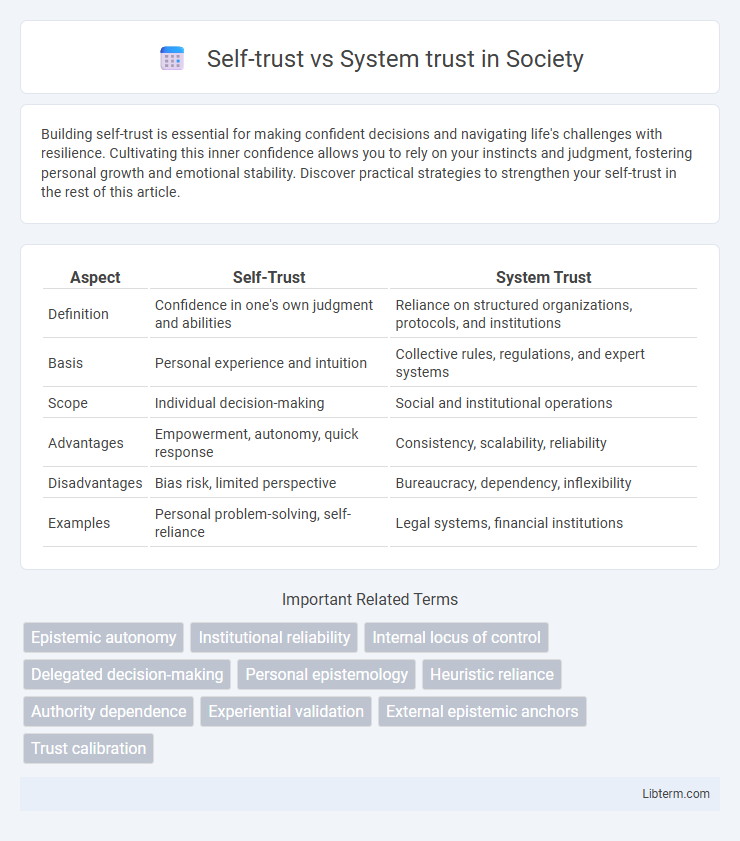Building self-trust is essential for making confident decisions and navigating life's challenges with resilience. Cultivating this inner confidence allows you to rely on your instincts and judgment, fostering personal growth and emotional stability. Discover practical strategies to strengthen your self-trust in the rest of this article.
Table of Comparison
| Aspect | Self-Trust | System Trust |
|---|---|---|
| Definition | Confidence in one's own judgment and abilities | Reliance on structured organizations, protocols, and institutions |
| Basis | Personal experience and intuition | Collective rules, regulations, and expert systems |
| Scope | Individual decision-making | Social and institutional operations |
| Advantages | Empowerment, autonomy, quick response | Consistency, scalability, reliability |
| Disadvantages | Bias risk, limited perspective | Bureaucracy, dependency, inflexibility |
| Examples | Personal problem-solving, self-reliance | Legal systems, financial institutions |
Understanding Self-Trust: Definition and Importance
Self-trust refers to an individual's confidence in their own judgment, abilities, and intuition, enabling consistent decision-making without relying heavily on external validation. It plays a critical role in personal growth and resilience, fostering autonomy and reducing dependence on external systems or authorities. Cultivating self-trust enhances emotional intelligence and empowers individuals to navigate uncertainty with greater clarity and conviction.
The Concept of System Trust in Modern Society
System trust in modern society refers to the confidence individuals place in institutions, technologies, and social frameworks to function reliably and fairly without direct supervision. This trust enables complex societal interactions, such as financial transactions, legal processes, and digital communication, to occur efficiently and securely. High levels of system trust are essential for economic development, social cohesion, and effective governance in contemporary interconnected environments.
Key Differences: Self-Trust vs System Trust
Self-trust relies on an individual's confidence in their own judgment, decision-making, and abilities, fostering personal autonomy and intrinsic motivation. System trust depends on confidence in external structures such as institutions, technology, or processes to deliver reliable outcomes and maintain order. Key differences include self-trust being subjective and internally generated, whereas system trust is objective, based on the perceived competence and integrity of external entities.
Historical Evolution of Trust Paradigms
The historical evolution of trust paradigms reveals a shift from self-trust, rooted in individual experience and personal judgment, to system trust, which relies on institutional frameworks, technological infrastructures, and social mechanisms. Early societies prioritized self-trust due to limited external resources, whereas modern complex economies and digital environments increasingly depend on system trust to ensure reliability and security. This transition reflects the growing complexity of interactions and the necessity for standardized trust models in governance, finance, and communication networks.
Factors Influencing Self-Trust
Factors influencing self-trust include past experiences, personal achievements, and consistent positive reinforcement, which strengthen confidence in one's abilities. Cognitive biases such as overconfidence or imposter syndrome can distort self-trust levels, affecting decision-making and self-efficacy. Emotional regulation and resilience also play critical roles in maintaining and rebuilding self-trust during challenging circumstances.
Determinants of System Trust
System trust is primarily determined by perceived system reliability, transparency, and user experience consistency, which influence individuals' confidence in automated processes and institutional frameworks. Factors such as clear communication of system functions, demonstrated accuracy, and safeguarding data privacy reinforce trustworthiness in digital and organizational systems. User feedback mechanisms and system adaptability to evolving needs also play critical roles in establishing sustained system trust over time.
Benefits and Risks of Relying on Self-Trust
Relying on self-trust enhances decision-making autonomy and fosters personal accountability, enabling individuals to develop confidence and resilience in uncertain situations. However, exclusive dependence on self-trust may lead to cognitive biases, limited perspectives, and potential errors due to inadequate information or expertise. Balancing self-trust with system trust, such as expert advice or institutional frameworks, optimizes outcomes by combining personal judgment with validated knowledge.
Advantages and Challenges of System Trust
System trust leverages established institutions, protocols, and technologies to provide consistent and scalable reliability, reducing the cognitive load on individuals by relying on transparent processes and verified mechanisms. Advantages include enhanced efficiency, predictability, and the ability to handle complex transactions or interactions that surpass individual capacity. Challenges involve vulnerability to systemic failures, potential for opacity in decision-making, and the risk of over-dependence that may diminish personal agency and critical assessment skills.
Balancing Self-Trust and System Trust for Optimal Decisions
Balancing self-trust and system trust is crucial for making optimal decisions, as self-trust leverages personal intuition and experience while system trust relies on data, algorithms, and external structures. Effective decision-making integrates confidence in one's judgment with the reliability of systematic processes, ensuring adaptability and accuracy. Recognizing when to rely on internal insights versus external systems minimizes bias and enhances overall decision quality.
Fostering Trust in a Complex World
Self-trust empowers individuals to confidently navigate uncertainty by relying on personal judgment, critical thinking, and experiential knowledge. System trust depends on the reliability, transparency, and accountability of institutions, technologies, or social networks to deliver consistent outcomes. Fostering trust in a complex world demands balancing self-trust and system trust through adaptive learning, open communication, and verification mechanisms that reinforce both personal confidence and collective reliability.
Self-trust Infographic

 libterm.com
libterm.com